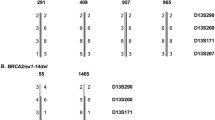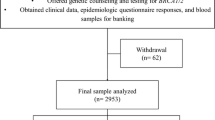Abstract
The Breast Cancer Family Registry is a resource for interdisciplinary and translational studies of the genetic epidemiology of breast cancer. This resource is available to researchers worldwide for collaborative studies. Herein, we report the results of testing for germline mutations in BRCA1 and BRCA2. We have tested 4,531 probands for mutations in BRCA1 and 4,084 in BRCA2. Deleterious mutations in BRCA1 and BRCA2 were identified for 9.8% of probands tested [233/4,531 (5.1%) for BRCA1 and 193/4,084 (4.7%) for BRCA2]. Of 1,385 Ashkenazi Jewish women tested for only the three founder mutations, 17.4% carried a deleterious mutation. In total, from the proband and subsequent family testing, 1,360 female mutation carriers (788 in BRCA1, 566 in BRCA2, 6 in both BRCA1 and BRCA2) have been identified. The value of the resource has been greatly enhanced by determining the germline BRCA1 and BRCA2 mutation statuses of nearly 6,000 probands.


Similar content being viewed by others
References
John EM, Hopper JL, Beck JC et al (2004) The Breast Cancer Family Registry: an infrastructure for cooperative multinational, interdisciplinary and translational studies of the genetic epidemiology of breast cancer. Breast Cancer Res 6:R375–R389. doi:10.1186/bcr801
Apicella C, Peacock SJ, Andrews L et al (2006) Determinants of preferences for genetic counselling in Jewish women. Fam Cancer 5:159–167. doi:10.1007/s10689-005-3871-7
Andrulis IL, Anton-Culver H, Beck J et al (2002) Comparison of DNA- and RNA-based methods for detection of truncating BRCA1 mutations. Hum Mutat 20:65–73. doi:10.1002/humu.10097
Ganguly A, Rock MJ, Prockop DJ (1993) Conformation-sensitive gel electrophoresis for rapid detection of single-base differences in double-stranded PCR products and DNA fragments: evidence for solvent-induced bends in DNA heteroduplexes. Proc Natl Acad Sci USA 90:10325–10329. doi:10.1073/pnas.90.21.10325
Korkko J, Annunen S, Pihlajamaa T et al (1998) Conformation sensitive gel electrophoresis for simple and accurate detection of mutations: comparison with denaturing gradient gel electrophoresis and nucleotide sequencing. Proc Natl Acad Sci USA 95:1681–1685. doi:10.1073/pnas.95.4.1681
Frank TS, Deffenbaugh AM, Reid JE et al (2002) Clinical characteristics of individuals with germline mutations in BRCA1 and BRCA2: analysis of 10,000 individuals. J Clin Oncol 20:1480–1490. doi:10.1200/JCO.20.6.1480
Keogh LA, Southey MC, Maskiell J et al (2004) Uptake of offer to receive genetic information about BRCA1 and BRCA2 mutations in an Australian population-based study. Cancer Epidemiol Biomarkers Prev 13:2258–2263
Goldgar DE, Easton DF, Deffenbaugh AM et al (2004) Integrated evaluation of DNA sequence variants of unknown clinical significance: application to BRCA1 and BRCA2. Am J Hum Genet 75:535–544. doi:10.1086/424388
Walsh T, Casadei S, Coats KH et al (2006) Spectrum of mutations in BRCA1, BRCA2, CHEK2, and TP53 in families at high risk of breast cancer. JAMA 295:1379–1388. doi:10.1001/jama.295.12.1379
Smith LD, Tesoriero AA, Ramus SJ et al (2007) BRCA1 promoter deletions in young women with breast cancer and a strong family history: a population-based study. Eur J Cancer 43:823–827. doi:10.1016/j.ejca.2007.01.011
Tavtigian SV, Deffenbaugh AM, Yin L et al (2006) Comprehensive statistical study of 452 BRCA1 missense substitutions with classification of eight recurrent substitutions as neutral. J Med Genet 43:295–305. doi:10.1136/jmg.2005.033878
Chen X, Truong TT, Weaver J et al (2006) Intronic alterations in BRCA1 and BRCA2: effect on mRNA splicing fidelity and expression. Hum Mutat 27:427–435. doi:10.1002/humu.20319
Abkevich V, Zharkikh A, Deffenbaugh AM et al (2004) Analysis of missense variation in human BRCA1 in the context of interspecific sequence variation. J Med Genet 41:492–507. doi:10.1136/jmg.2003.015867
Easton DF, Deffenbaugh AM, Pruss D et al (2007) A systematic genetic assessment of 1,433 sequence variants of unknown clinical significance in the BRCA1 and BRCA2 breast cancer-predisposition genes. Am J Hum Genet 81:873–883. doi:10.1086/521032
Ozcelik H, Knight JA, Glendon G et al (2003) Individual and family characteristics associated with protein truncating BRCA1 and BRCA2 mutations in an Ontario population based series from the Cooperative Family Registry for Breast Cancer Studies. J Med Genet 40:e91. doi:10.1136/jmg.40.8.e91
Southey MC, Tesoriero AA, Andersen CR et al (1999) BRCA1 mutations and other sequence variants in a population-based sample of Australian women with breast cancer. Br J Cancer 79:34–39. doi:10.1038/sj.bjc.6690008
John EM, Miron A, Gong G et al (2007) Prevalence of pathogenic BRCA1 mutation carriers in 5 US racial/ethnic groups. JAMA 298:2869–2876. doi:10.1001/jama.298.24.2869
Whittemore AS, Gong G, John EM et al (2004) Prevalence of BRCA1 mutation carriers among U.S. non-Hispanic Whites. Cancer Epidemiol Biomarkers Prev 13:2078–2083
Haile RW, Thomas DC, McGuire V et al (2006) BRCA1 and BRCA2 mutation carriers, oral contraceptive use, and breast cancer before age 50. Cancer Epidemiol Biomarkers Prev 15:1863–1870. doi:10.1158/1055-9965.EPI-06-0258
McGuire V, John EM, Felberg A et al (2006) No increased risk of breast cancer associated with alcohol consumption among carriers of BRCA1 and BRCA2 mutations ages <50 years. Cancer Epidemiol Biomarkers Prev 15:1565–1567. doi:10.1158/1055-9965.EPI-06-0323
Breast Cancer Family Registry, Kathleen Cunningham Consortium for Research into Familial Breast Cancer (Australasia), Ontario Cancer Genetics Network (Canada) (2007) Smoking and risk of breast cancer in carriers of mutations in BRCA1 or BRCA2 aged less than 50 years. Breast Cancer Res Treat 109:67–75
Antoniou AC, Sinilnikova OM, Simard J et al (2007) RAD51 135G→C modifies breast cancer risk among BRCA2 mutation carriers: results from a combined analysis of 19 studies. Am J Hum Genet 81:1186–1200. doi:10.1086/522611
Couch FJ, Sinilnikova O, Vierkant RA et al (2007) AURKA F31I polymorphism and breast cancer risk in BRCA1 and BRCA2 mutation carriers: a consortium of investigators of modifiers of BRCA1/2 study. Cancer Epidemiol Biomarkers Prev 16:1416–1421. doi:10.1158/1055-9965.EPI-07-0129
Lee JS, John EM, McGuire V et al (2006) Breast and ovarian cancer in relatives of cancer patients, with and without BRCA mutations. Cancer Epidemiol Biomarkers Prev 15:359–363. doi:10.1158/1055-9965.EPI-05-0687
Acknowledgments
This work was supported by the National Cancer Institute, National Institutes of Health under RFA # CA-95-011 and through cooperative agreements with members of the Breast Cancer Family Registry and Principal Investigators, including Cancer Care Ontario (U01 CA69467), Columbia University (U01 CA69398), Fox Chase Cancer Center (U01 CA69631), Huntsman Cancer Institute (U01 CA69446), Huntsman Cancer Institute (U01 CA69446), Northern California Cancer Center (U01 CA69417), University of Melbourne (U01 CA69638), and Research Triangle Institute Informatics Support Center (RFP No. N02PC45022-46). Mutation testing in Australia was supported by grants from the National Health and Medical Research Council (NHMRC) and the Victorian Breast Cancer Research Consortium (VBCRC). Mutation testing at Fox Chase Cancer Center was in part supported by an Ovarian Cancer SPORE grant (P50 CA83638). Mutation testing in Ontario was supported in part by Cancer Care Ontario. We wish to thank members of the Ontario Cancer Genetics Network for their contributions to the study. MCS is a Senior Research Fellow of the NHMRC and JLH is an Australia Fellow and a VBCRC Group Leader. The content of this manuscript does not necessarily reflect the views or policies of the National Cancer Institute or any of the collaborating centers in the Breast CFR, nor does mention of trade names, commercial products, or organizations imply endorsement by the US Government or the Breast CFR.
Author information
Authors and Affiliations
Consortia
Corresponding author
Rights and permissions
About this article
Cite this article
Neuhausen, S.L., Ozcelik, H., Southey, M.C. et al. BRCA1 and BRCA2 mutation carriers in the Breast Cancer Family Registry: an open resource for collaborative research. Breast Cancer Res Treat 116, 379–386 (2009). https://doi.org/10.1007/s10549-008-0153-8
Received:
Accepted:
Published:
Issue Date:
DOI: https://doi.org/10.1007/s10549-008-0153-8




